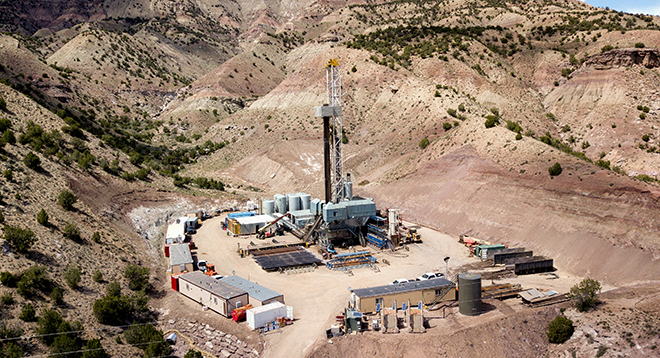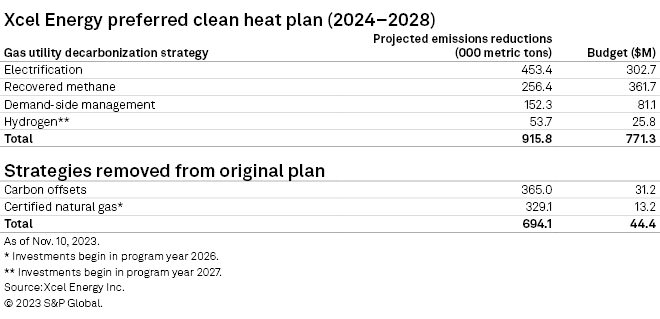S&P Global Offerings
Featured Topics
Featured Products
Events
S&P Global Offerings
Featured Topics
Featured Products
Events
S&P Global Offerings
Featured Topics
Featured Products
Events
Banking & Capital Markets
Economy & Finance
Energy Transition & Sustainability
Technology & Innovation
Podcasts & Newsletters
Banking & Capital Markets
Economy & Finance
Energy Transition & Sustainability
Technology & Innovation
Podcasts & Newsletters
S&P Global Offerings
Featured Topics
Featured Products
Events
13 Nov, 2023

|
Xcel Energy faced pushback for seeking to reduce gas utility and end-use combustion emissions by purchasing natural gas that is certified as having lower carbon intensity. |
Xcel Energy Inc. subsidiary Public Service Co. of Colorado revised its first Colorado clean heat plan after stakeholders challenged the proposal's reliance on certified natural gas and carbon offsets to achieve state-mandated greenhouse gas emissions reductions.
The utility, which does business as Xcel Energy in Colorado, will no longer seek permission to count certified gas and carbon offset purchases toward the emissions reduction target. However, Xcel will still seek approval to purchase certified gas as part of the proceeding. The revised plan also retained certified gas and carbon offset programs proposed in the original Aug. 1 filing (Docket No. 23A-0392EG).
The reversal, and comments from the Colorado Public Utilities Commission, signaled that other investor-owned gas utilities will not be able to use certified gas or offsets to comply with Colorado Senate Bill 21-264. The 2021 law required gas utilities to deploy clean heat resources to reduce company and customer emissions 22% from 2015 levels by 2030.
The revised plan retains the same level of investments in electrification, demand-side management, low-carbon hydrogen and recovered methane included in Xcel's original preferred portfolio. It yields fewer net benefits than the earlier proposal but remains less expensive than other portfolios that Xcel explored, including one that reduces emissions solely through building electrification, according to Jack Ihle, regional vice president of regulatory policy at Xcel.

"It makes the greatest practicable progress toward the 2025 and 2030 Clean Heat Targets under realistic assumptions of the pace of electrification adoption," Ihle said in Nov. 6 written testimony. "The portfolio also reflects the company's continued commitment to using a diverse portfolio of resources to increase the chances that we can scale multiple new technologies."
Decision followed debate
Xcel had proposed certified gas and offset purchases largely to reduce the plan's cost to ratepayers. Analysis commissioned by Xcel found that several different clean heat resource portfolios capable of hitting the target exceeded the annual budget established by lawmakers. Meanwhile, a budget-friendly portfolio could not achieve the law's 2030 goal, according to the modeling.
In September, a coalition that included climate and renewable energy groups sought to block the plan from further consideration. They argued that only clean heat resources that cut emissions from certain distribution infrastructure and from gas use in homes and businesses count toward the law's target. Certified gas reduces emissions further upstream the gas value chain, while offsets affect emissions not linked to gas distribution, they said.
Certified gas, also known as responsibly sourced or differentiated gas, is verified at the wellhead and along the value chain to meet certain emission intensity thresholds and often other environmental, social and governance standards. Carbon offsets typically involve investments in carbon sinks such as reforestation projects.
In October, the PUC denied the opponents' motion seeking a ruling that commissioners lack legal authority to consider any clean heat plan that includes certified gas or offsets. The PUC instead decided to resolve the issue through evidentiary hearings in December.
But shortly afterward, Xcel sought permission to revise its clean heat application. The PUC approved the request Nov. 3 and canceled the evidentiary hearings. Xcel filed its revised plan Nov. 6.
'Distraction' and 'profound skepticism'
In an Oct. 27 motion to amend the plan, Xcel said "the issue of whether [certified gas] and offsets may count as emissions reductions for purposes of the clean heat targets has become a distraction to the primary goal of this proceeding: taking concerted action to cost-effectively reduce emissions from the gas system."
Xcel also noted that the PUC recently decided that resources not identified in the clean heat law, including certified gas and offsets, must reduce emissions "from the distribution and end-use combustion of gas." Commissioners expressed "profound skepticism that [certified natural gas] and carbon offsets may count towards ... clean heat target accounting," PUC staff said in an Oct. 30 filing.
Some opponents of Xcel's original plan asked the PUC to leave the evidentiary hearings on the calendar. They said other gas utilities could include certified gas and carbon offsets in their clean heat plans if the PUC does not rule decisively on the issue in December.
PUC staff said the hearings were not necessary because commissioners had clearly telegraphed their views ahead of a Jan. 1, 2024, deadline for Atmos Energy Corp. and Black Hills Corp. to file clean heat plans. Black Hills does not plan to include either resource in its proposal, the company said in its response to Xcel's motion.
Venue for certified gas purchases
Despite removing certified gas from its clean heat target accounting, Xcel urged the PUC to use the proceeding to consider the resource's potential to support the state's overarching goal to reduce economywide emissions 50% from 2005 levels by 2030.
To that effect, Xcel proposed purchasing the same volume of certified gas proposed in its initial preferred portfolio. The company would recover the cost of purchasing the physical certified gas and credits linked to its environmental benefits through its gas cost adjustment mechanism. Previously, it proposed recouping environmental attribute costs through an adjustment under the clean heat plan.
The original and revised plans included a certified gas pilot project, which would see Xcel purchase certified gas and its environmental attributes from pipeline operator Williams Cos. Inc. The project would use real-time tools, including ground-level direct monitoring and satellite and plane over-flight measurement.
As standards and the market for certified gas continue to evolve, these "tools will provide for a level of continuous emissions monitoring that is unusual in the current environment," Xcel energy and environmental policy manager Sydnie Lieb said in Aug. 1 written testimony. Xcel and Williams, working with data technology company Context Labs, would "demonstrate the accuracy of the data as a model for expanding improved measurement and verification technologies with the expectation that the improved technologies could be expanded to other [certified gas] purchases in the future," she said.
The revised plan also retained Xcel's application for its Renewable*Connect Natural Gas, a program that would allow customers to purchase blocks of renewable natural gas and carbon offsets to mitigate their emissions.
S&P Global Commodity Insights produces content for distribution on S&P Capital IQ Pro.
